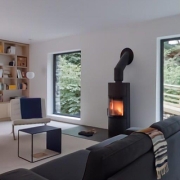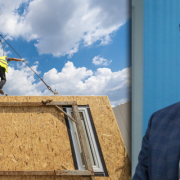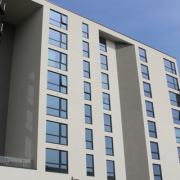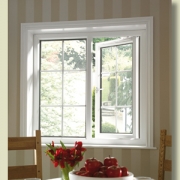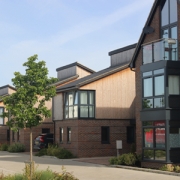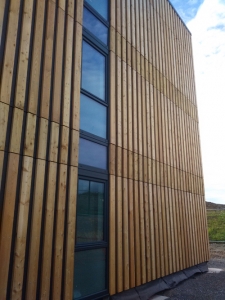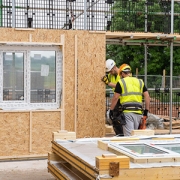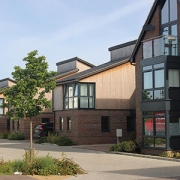A derelict mill in a Cumbrian hamlet has been transformed over a three and a half year self-build project into a stunning four bedroom, four bathroom house, together with workshop and office space. Featured on Channel 4’s Grand Designs programme, the project saw a new timber-framed, SIPS-construction house built within the footprint of the existing mill building, with many of the original materials, retained or reclaimed and reused.
The blacking mill, a Scheduled Ancient Monument, had lain empty and deteriorating for 60 years and required full restoration. Marlin Windows, one of Smart Architectural Aluminium’s key partners, worked closely with the architect and client to design, fabricate and install 40 windows and 7 doors as part of the project.

Adrian Martin, Marlin Windows’ Managing Director, said: “Our brief was to provide contemporary aluminium windows and doors with flat, square edged profiles that would not only echo the design style and architectural lines of the building, but would also maximise the natural light coming into it. We were also tasked with ensuring the colour and finish were sympathetic to the reclaimed stone and new timber facing materials, as well as the surrounding natural environment.”
For the main feature windows, the experienced Marlin team installed Smart’s EcoFutural system, with its slim profiles and outstanding thermal efficiency enabling the maximum glass area to be achieved. Smart’s Alitherm 800 casement windows were then used elsewhere to provide natural ventilation and fire exit options.
Two large Smart Visoglide Plus sliding doors were incorporated to enhance the open plan living space, flood the room with light and open up the panoramic views beyond. Featuring slim frames to maximise the glazed areas, Kevin McCloud, Grand Designs’ presenter, said of the seven metre wide sliding doors: “That vast window is panoramic, it’s like a super-wide cinema screen. It almost completely fills my field of vision.”
Providing a stunning main entrance to the property, a wide Sherbourne door style from Smart’s high-performance Designer Door range was installed, featuring a low threshold for easy access and matching glazed side light. The company’s Alitherm Plus door system was installed for access to the workshop, utility and roof garden areas.
The windows and doors were all painted in textured Vulcan Black from Smart’s sensations colour range, the colour selected to harmonise with the local environment and adjacent materials.
Smart’s Managing Director, Eddie Robinson, said “This is a fantastic project, with huge credit going to Adrian and the team at Marlin Windows for the quality of the fenestration work. The products not only look magnificent in this unique project, but their thermal performance will make a significant contribution to energy-efficiency.”
External shots: “Images courtesy of Marlin Windows”
Internal shot: “Image courtesy of Grand Designs”


